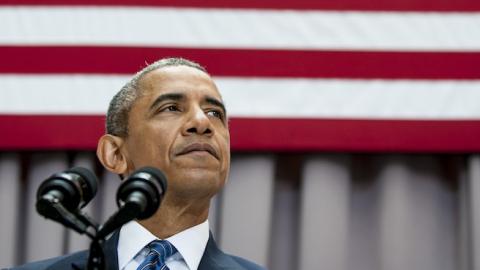In book three of Plato’s Republic, Socrates develops his concept of the ideal city, composed of distinct classes of rulers, soldiers, and workers. In order to convince the people of his wisdom, however, Socrates finds it necessary to spin an elaborate tale — a "noble lie to persuade, in the best case, even the rulers, but if not them, the rest of the city.” Socrates justifies this fiction as a way to advance the common good.
Today, it is worth asking whether our own modern-day philosopher king, President Barack Obama, is pursuing a similar strategy for selling the nuclear deal with Iran, announced one year ago next month. For the past year, time and again, the president and his faithful secretary of state have advanced a policy of rapprochement with Iran, recast for the American public as principled diplomacy. The upshot is a series of situational claims and inconsistencies, all of which bend in the same direction — toward Iran.
Obama’s favorite chronicler, the Atlantic's Jeffrey Goldberg, has given us insight into the technique. In April, Goldberg told us that “Obama generally believes that the Washington foreign-policy establishment, which he secretly disdains, makes a fetish of ‘credibility.’” Obama elaborated on that theme in the same interview, proclaiming himself “very proud” for declining to strike Syrian President Bashar al-Assad after the Iranian proxy gassed his own people, despite the perception “that my credibility was at stake, that America’s credibility was at stake.”
Just last year, however, Secretary of State John Kerry was singing the opposite tune. In July 2015, Kerry demanded that Congress approve the Iran deal, or else “the U.S. will have lost all credibility.” In September, the White House argued in a statement of administration policy that disapproval of the deal “would deal a devastating blow to America’s credibility as a leader of diplomacy.” And this month, Kerry argued that “future dealings” with Iran demand his “good faith in executing this agreement” — including his travels from London to Oslo to improve what he claims is lagging investor interest in Iran. For team Obama, it seems that credibility matters, except for when it doesn’t.
That Kerry has found it necessary to travel across Europe as Iran’s economic emissary exposes another of the Obama administration’s inconsistencies. Last August, as part of his efforts to sell the Iran deal, Kerry warned, “If we turn around and nix the deal and then tell them, ‘You’re going to have to obey our rules and sanctions anyway,’ that is a recipe, very quickly … for the American dollar to cease to be the reserve currency of the world.” Obama made the same dire prediction at the time, arguing that a failure to implement the nuclear deal would “raise questions internationally about the dollar’s role as the world’s reserve currency.”
Now, the Obama administration is considering dollarizing Iranian transactions — despite categorical assurances to the contrary last September — while Kerry travels the world to drum up investors for the Islamic Republic. In London in May, Kerry complained that businesses “shouldn’t say, ‘Oh, we can’t do it because the United States.’ That’s just not fair” while conceding that banks “have concerns about our secondary sanctions….” To hear the Obama administration tell it, the dollar is somehow too weak and too strong — too weak to sustain the sanctions regime before the nuclear deal, yet strong enough that investors are deterred from going into Iran after the agreement.
In March 2015, Obama asked Congress to exercise forbearance, assuring members, “Let’s wait until there’s actually a deal on the table that Iran has agreed to, at which point everybody can evaluate it. You don’t have to speculate.” As soon as the agreement was announced, however, the president’s chief negotiator shut down the debate: “[I]t would have been a little difficult when all of the members of the P5+1 wanted to go to the United Nations … for us to say, ‘Well, excuse me, the world, you should wait for the United States Congress.’” Congress never did get its vote — a bait and switch that set the scene for the year to come.
As the anniversary of the nuclear accord nears, we can be sure that the Obama administration and its allies will treat us to a slew of congratulatory stories about the deal, with an eye toward making it permanent. Indeed, over the remaining seven months of his presidency, Obama will work to make the Iran deal as difficult as possible for any future administration to unravel. Just last week, for example, U.S. officials facilitated Boeing’s blockbuster $25 billion deal to sell airliners to Iran, while the Financial Action Task Force, a global agency charged with monitoring money laundering, suspended several restrictions against Iran. These are the hard facts that matter far more than any narrative that the White House pushes.
Socrates justified his fiction on the basis that it produced a more benign political outcome. Obama’s political allies and Iran deal enthusiasts have taken comfort in a similar claim. To be sure, the White House may have admittedly advanced some problematic arguments, but all in the service of a noble vision. Don’t fall for it. History will judge the Obama administration’s style in advancing the nuclear deal to be as checkered as the deal itself.

















